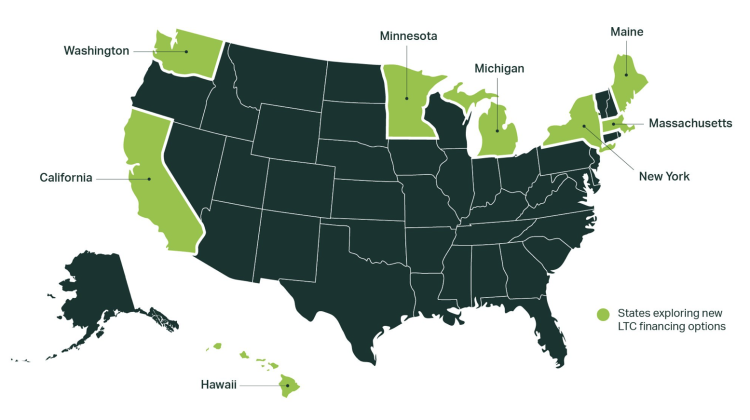Ensuring More Sustainable and Affordable Long-Term Care in the US
A generally accepted equation for calculating when a person can retire is to estimate future costs at 80% of your current expenses and multiply that by the years you expect to live after retirement. This equation focuses on relatively regular expenditures, for example your mortgage and average grocery bills, but omits the rising costs of long-term care. An example of these significant but often missing costs include nursing homes and home caregivers, which in the US can average around $60,000 to $100,000 annually. With such expensive long-term costs adding to the strain of inequity of the ability to retire comfortably driven by the 401(k) focus on financial security, what are states and the federal government doing to better serve workers, consumers, and family caregivers?
An ongoing study at MIT Community Innovators Lab (CoLab), State By State Long-Term Care Progress, focuses on how states like Washington, Minnesota, and Massachusetts are adapting and finding solutions to help the middle class pay for long-term care. Their work was recently covered in the Conversation, by Mel King Community Fellow Marc Cohen. “Our study provides an update on progress in four states, providing lessons and a roadmap for other states interested in making long-term care more affordable and accessible,” says Allison Cook, one of the team members of the research team responsible for State By State Long-Term Care Progress and the associated resource hub. “State successes can build momentum for future federal interventions that would ensure benefits could be shared by all Americans, similar to Social Security, which in the era of the 401(k) is a crucial safety net for most Americans.”
Cook is the Long-Term Services and Supports (LTSS) Consultant, where she identifies strategic opportunities, conducts research, and provides policy expertise to the Centering Equity in Long-Term Care Class of the Mel King Fellowship Program. Cook also founded and leads Better Aging and Policy Consulting, an organization devoted to creating systems that enable quality lives for both older adults and those who provide services to them. Additional members of the team include Grant Williams (MCP ‘17) and Sally Oh.
Williams is the director of the Climate Futures Program at CoLab. He is an economic development specialist with a deep commitment to climate justice and empowering community solutions for a just transition. Williams designed and led rural electric cooperative campaigns across the Southern US and led the Long-Term Care agenda for the 2022-2023 cohort of the Mel King Community Fellows Program (MKCFP).
Oh, a Masters of City Planning candidate at DUSP, is a CoLab Research Assistant and has supported the Mel King Fellowship over the past two years. Her interests are centered on community-based work that promotes economic democracy, participatory action, and deeper inclusion of historically marginalized communities.
CoLab, a center housed within the Department of Urban Studies and Planning at MIT, facilitates the interchange of knowledge and resources between MIT and community organizations. Through CoLab, members of the DUSP community are engaged in working with and for communities to spur changes for greater equity and sustainability. CoLab’s examination of how state governments are addressing long-term care costs, and how these actions might be leveraged into other state and federal policy, was driven by the 2022-2023 cohort of the MKCFP. The MKCFP seeks to honor the legacy of Mel King, an adjunct professor emeritus at MIT who's teaching, work, and ideas shaped DUSP and its community.
“This report and the Resource Hub is the culmination of MIT CoLab's Mel King Fellowship Centering Equity in Long-Term Care Cohort,” adds Williams. “The work, however, will continue through the state coalitions, advocacy efforts, and policymakers happening on the ground. The Resource Hub is intended to be a resource of our learnings and materials for the field.”



